Mental Health Patients seeking General Care
VerifiedAdded on 2022/08/20
|14
|3748
|33
AI Summary
Contribute Materials
Your contribution can guide someone’s learning journey. Share your
documents today.
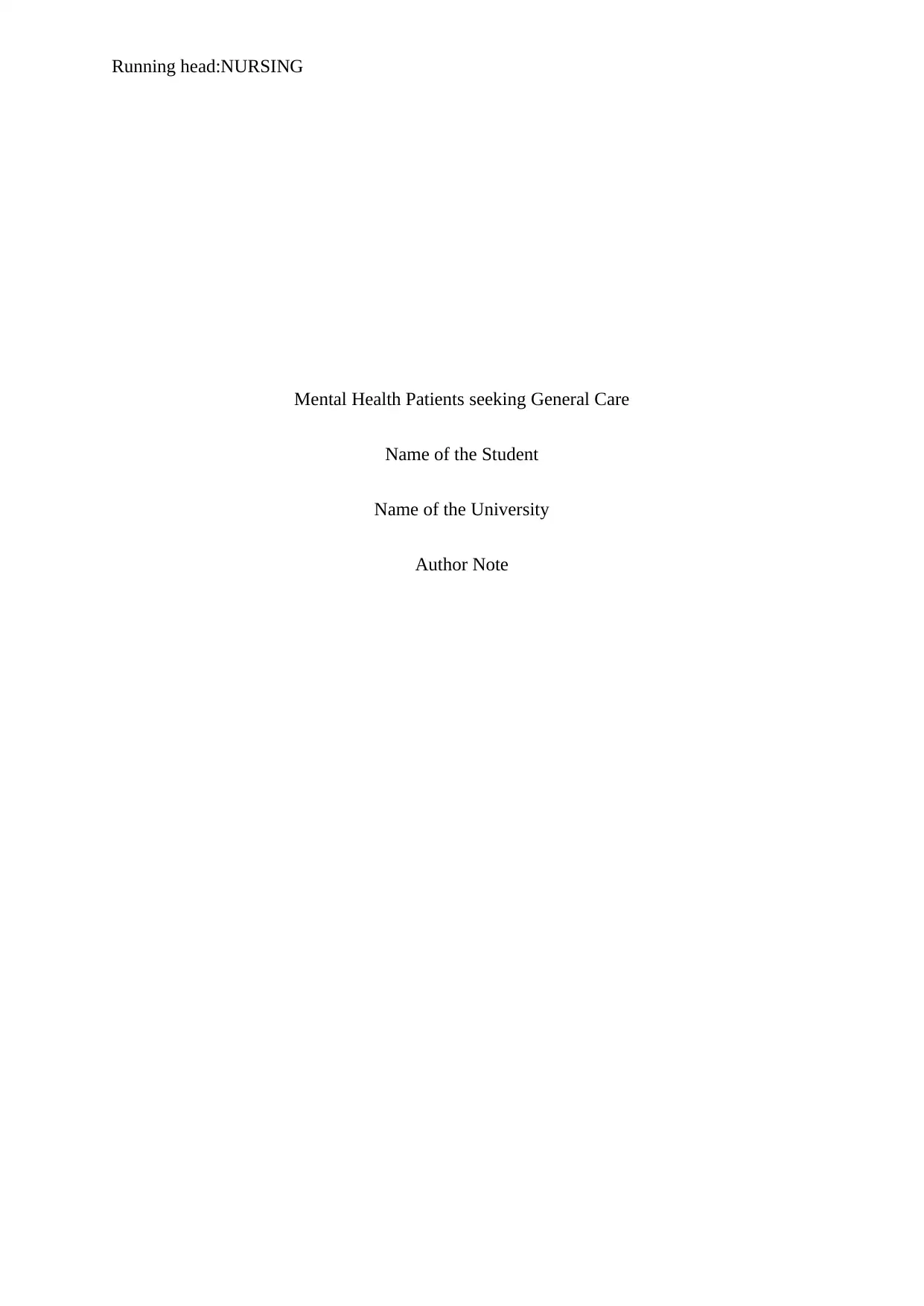
Running head:NURSING
Mental Health Patients seeking General Care
Name of the Student
Name of the University
Author Note
Mental Health Patients seeking General Care
Name of the Student
Name of the University
Author Note
Secure Best Marks with AI Grader
Need help grading? Try our AI Grader for instant feedback on your assignments.
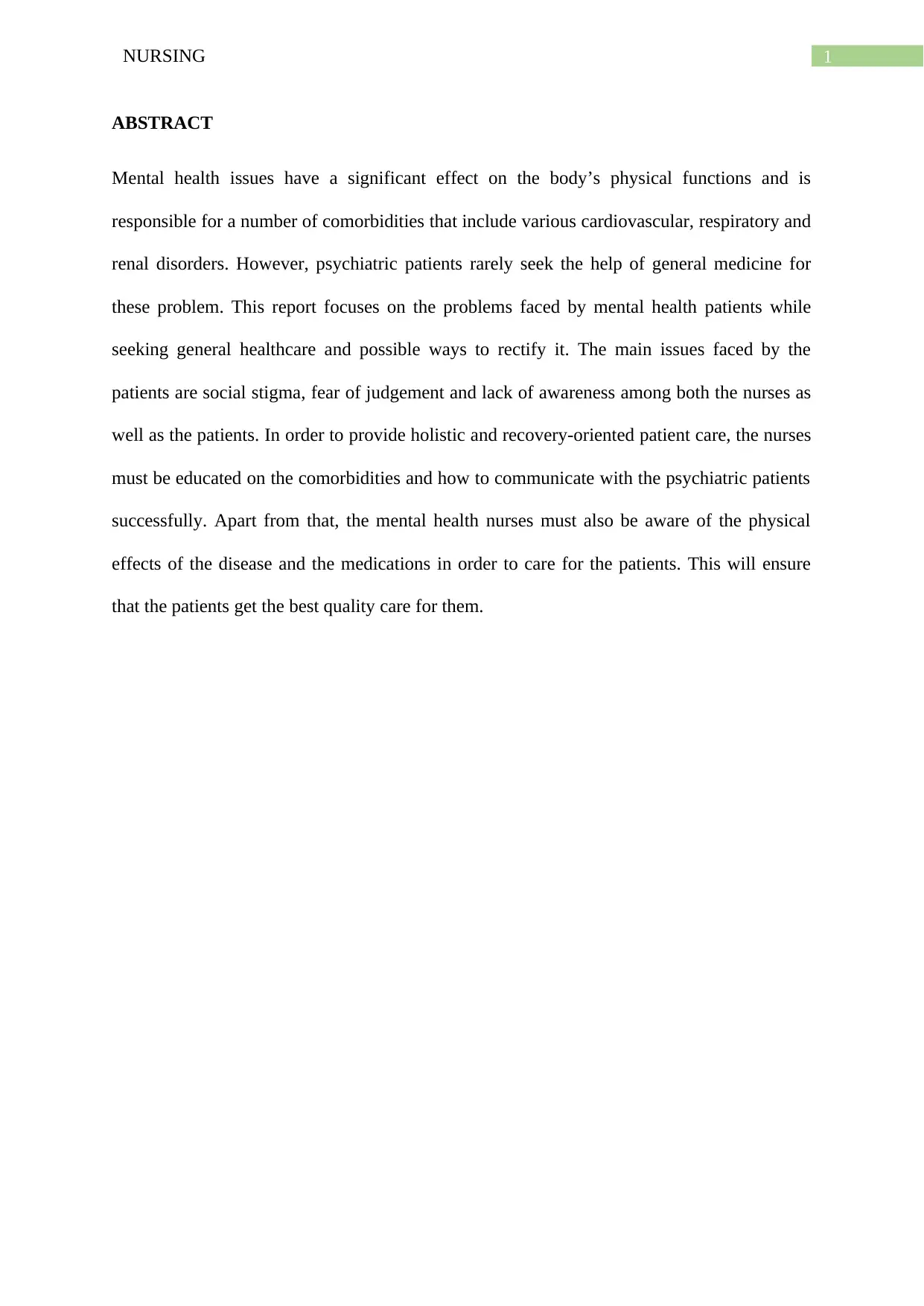
1NURSING
ABSTRACT
Mental health issues have a significant effect on the body’s physical functions and is
responsible for a number of comorbidities that include various cardiovascular, respiratory and
renal disorders. However, psychiatric patients rarely seek the help of general medicine for
these problem. This report focuses on the problems faced by mental health patients while
seeking general healthcare and possible ways to rectify it. The main issues faced by the
patients are social stigma, fear of judgement and lack of awareness among both the nurses as
well as the patients. In order to provide holistic and recovery-oriented patient care, the nurses
must be educated on the comorbidities and how to communicate with the psychiatric patients
successfully. Apart from that, the mental health nurses must also be aware of the physical
effects of the disease and the medications in order to care for the patients. This will ensure
that the patients get the best quality care for them.
ABSTRACT
Mental health issues have a significant effect on the body’s physical functions and is
responsible for a number of comorbidities that include various cardiovascular, respiratory and
renal disorders. However, psychiatric patients rarely seek the help of general medicine for
these problem. This report focuses on the problems faced by mental health patients while
seeking general healthcare and possible ways to rectify it. The main issues faced by the
patients are social stigma, fear of judgement and lack of awareness among both the nurses as
well as the patients. In order to provide holistic and recovery-oriented patient care, the nurses
must be educated on the comorbidities and how to communicate with the psychiatric patients
successfully. Apart from that, the mental health nurses must also be aware of the physical
effects of the disease and the medications in order to care for the patients. This will ensure
that the patients get the best quality care for them.
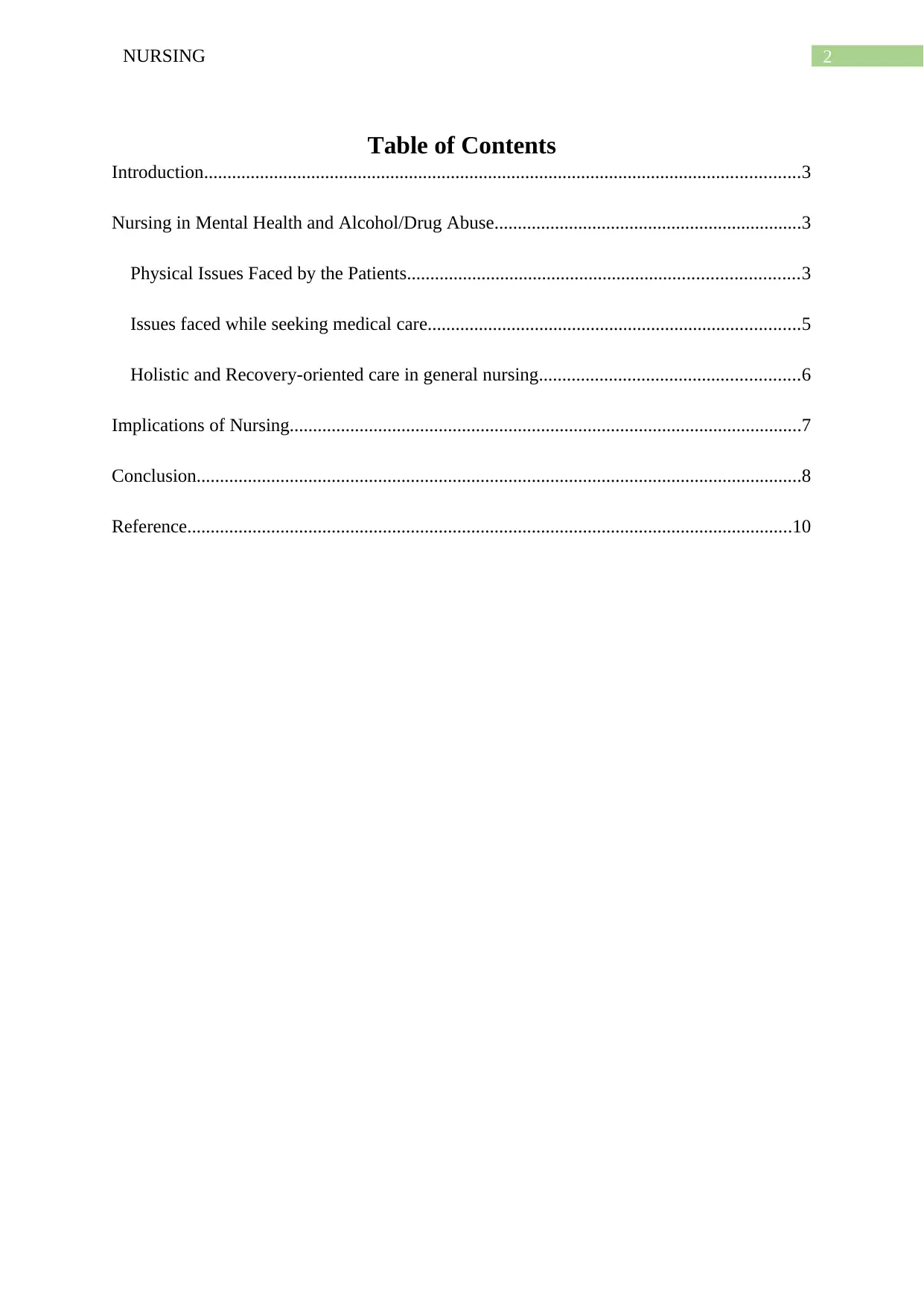
2NURSING
Table of Contents
Introduction................................................................................................................................3
Nursing in Mental Health and Alcohol/Drug Abuse..................................................................3
Physical Issues Faced by the Patients....................................................................................3
Issues faced while seeking medical care................................................................................5
Holistic and Recovery-oriented care in general nursing........................................................6
Implications of Nursing..............................................................................................................7
Conclusion..................................................................................................................................8
Reference..................................................................................................................................10
Table of Contents
Introduction................................................................................................................................3
Nursing in Mental Health and Alcohol/Drug Abuse..................................................................3
Physical Issues Faced by the Patients....................................................................................3
Issues faced while seeking medical care................................................................................5
Holistic and Recovery-oriented care in general nursing........................................................6
Implications of Nursing..............................................................................................................7
Conclusion..................................................................................................................................8
Reference..................................................................................................................................10
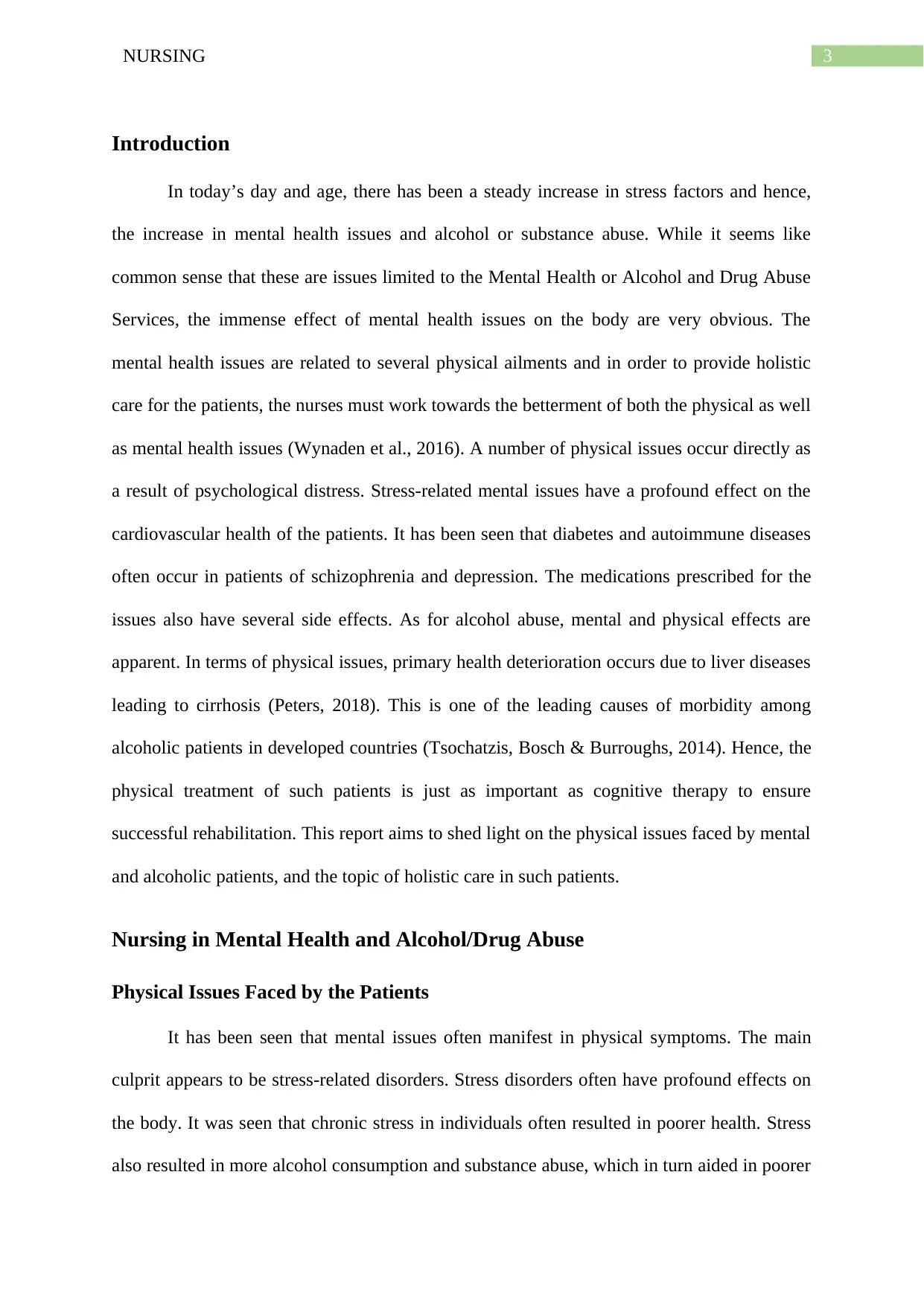
3NURSING
Introduction
In today’s day and age, there has been a steady increase in stress factors and hence,
the increase in mental health issues and alcohol or substance abuse. While it seems like
common sense that these are issues limited to the Mental Health or Alcohol and Drug Abuse
Services, the immense effect of mental health issues on the body are very obvious. The
mental health issues are related to several physical ailments and in order to provide holistic
care for the patients, the nurses must work towards the betterment of both the physical as well
as mental health issues (Wynaden et al., 2016). A number of physical issues occur directly as
a result of psychological distress. Stress-related mental issues have a profound effect on the
cardiovascular health of the patients. It has been seen that diabetes and autoimmune diseases
often occur in patients of schizophrenia and depression. The medications prescribed for the
issues also have several side effects. As for alcohol abuse, mental and physical effects are
apparent. In terms of physical issues, primary health deterioration occurs due to liver diseases
leading to cirrhosis (Peters, 2018). This is one of the leading causes of morbidity among
alcoholic patients in developed countries (Tsochatzis, Bosch & Burroughs, 2014). Hence, the
physical treatment of such patients is just as important as cognitive therapy to ensure
successful rehabilitation. This report aims to shed light on the physical issues faced by mental
and alcoholic patients, and the topic of holistic care in such patients.
Nursing in Mental Health and Alcohol/Drug Abuse
Physical Issues Faced by the Patients
It has been seen that mental issues often manifest in physical symptoms. The main
culprit appears to be stress-related disorders. Stress disorders often have profound effects on
the body. It was seen that chronic stress in individuals often resulted in poorer health. Stress
also resulted in more alcohol consumption and substance abuse, which in turn aided in poorer
Introduction
In today’s day and age, there has been a steady increase in stress factors and hence,
the increase in mental health issues and alcohol or substance abuse. While it seems like
common sense that these are issues limited to the Mental Health or Alcohol and Drug Abuse
Services, the immense effect of mental health issues on the body are very obvious. The
mental health issues are related to several physical ailments and in order to provide holistic
care for the patients, the nurses must work towards the betterment of both the physical as well
as mental health issues (Wynaden et al., 2016). A number of physical issues occur directly as
a result of psychological distress. Stress-related mental issues have a profound effect on the
cardiovascular health of the patients. It has been seen that diabetes and autoimmune diseases
often occur in patients of schizophrenia and depression. The medications prescribed for the
issues also have several side effects. As for alcohol abuse, mental and physical effects are
apparent. In terms of physical issues, primary health deterioration occurs due to liver diseases
leading to cirrhosis (Peters, 2018). This is one of the leading causes of morbidity among
alcoholic patients in developed countries (Tsochatzis, Bosch & Burroughs, 2014). Hence, the
physical treatment of such patients is just as important as cognitive therapy to ensure
successful rehabilitation. This report aims to shed light on the physical issues faced by mental
and alcoholic patients, and the topic of holistic care in such patients.
Nursing in Mental Health and Alcohol/Drug Abuse
Physical Issues Faced by the Patients
It has been seen that mental issues often manifest in physical symptoms. The main
culprit appears to be stress-related disorders. Stress disorders often have profound effects on
the body. It was seen that chronic stress in individuals often resulted in poorer health. Stress
also resulted in more alcohol consumption and substance abuse, which in turn aided in poorer
Secure Best Marks with AI Grader
Need help grading? Try our AI Grader for instant feedback on your assignments.
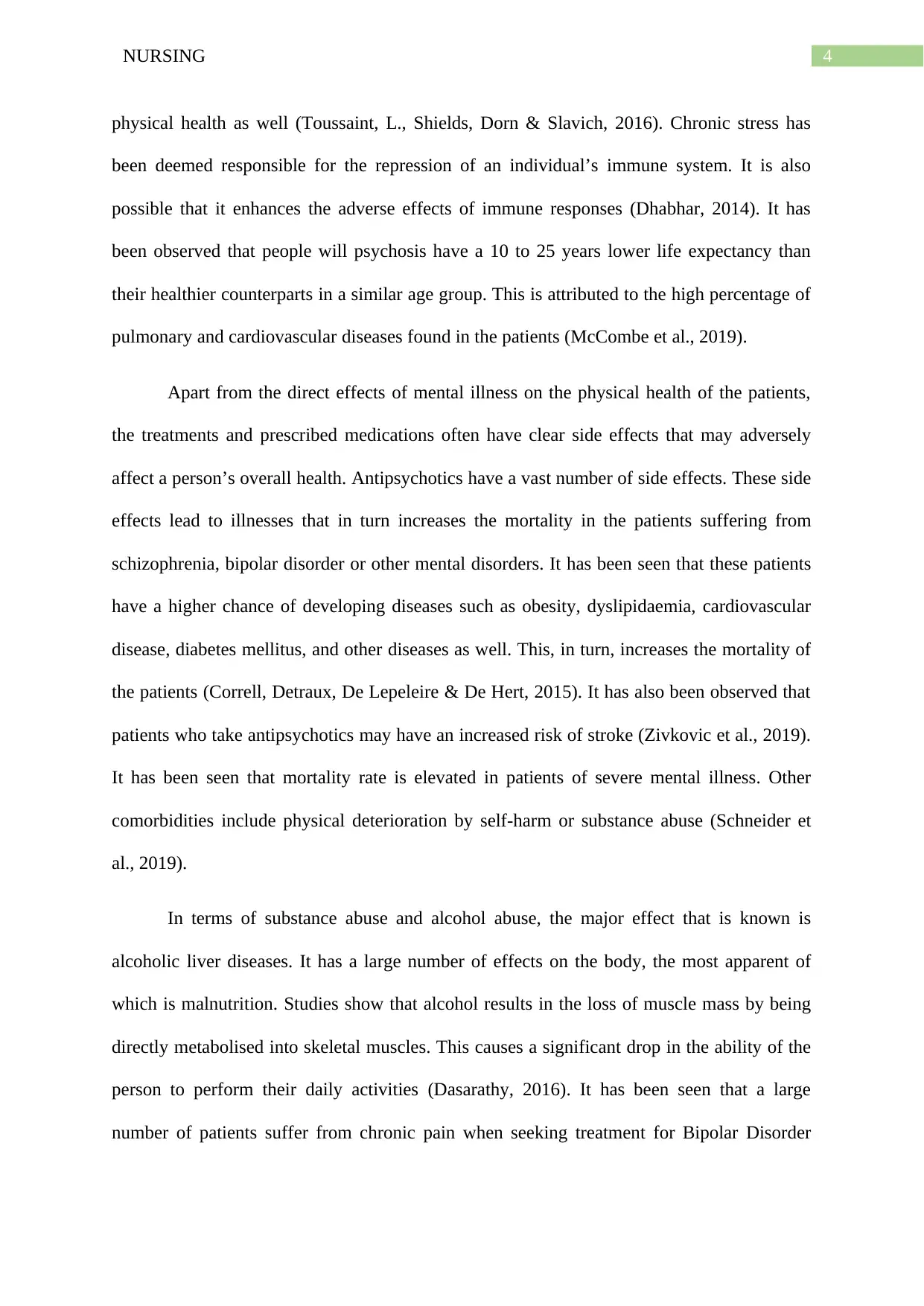
4NURSING
physical health as well (Toussaint, L., Shields, Dorn & Slavich, 2016). Chronic stress has
been deemed responsible for the repression of an individual’s immune system. It is also
possible that it enhances the adverse effects of immune responses (Dhabhar, 2014). It has
been observed that people will psychosis have a 10 to 25 years lower life expectancy than
their healthier counterparts in a similar age group. This is attributed to the high percentage of
pulmonary and cardiovascular diseases found in the patients (McCombe et al., 2019).
Apart from the direct effects of mental illness on the physical health of the patients,
the treatments and prescribed medications often have clear side effects that may adversely
affect a person’s overall health. Antipsychotics have a vast number of side effects. These side
effects lead to illnesses that in turn increases the mortality in the patients suffering from
schizophrenia, bipolar disorder or other mental disorders. It has been seen that these patients
have a higher chance of developing diseases such as obesity, dyslipidaemia, cardiovascular
disease, diabetes mellitus, and other diseases as well. This, in turn, increases the mortality of
the patients (Correll, Detraux, De Lepeleire & De Hert, 2015). It has also been observed that
patients who take antipsychotics may have an increased risk of stroke (Zivkovic et al., 2019).
It has been seen that mortality rate is elevated in patients of severe mental illness. Other
comorbidities include physical deterioration by self-harm or substance abuse (Schneider et
al., 2019).
In terms of substance abuse and alcohol abuse, the major effect that is known is
alcoholic liver diseases. It has a large number of effects on the body, the most apparent of
which is malnutrition. Studies show that alcohol results in the loss of muscle mass by being
directly metabolised into skeletal muscles. This causes a significant drop in the ability of the
person to perform their daily activities (Dasarathy, 2016). It has been seen that a large
number of patients suffer from chronic pain when seeking treatment for Bipolar Disorder
physical health as well (Toussaint, L., Shields, Dorn & Slavich, 2016). Chronic stress has
been deemed responsible for the repression of an individual’s immune system. It is also
possible that it enhances the adverse effects of immune responses (Dhabhar, 2014). It has
been observed that people will psychosis have a 10 to 25 years lower life expectancy than
their healthier counterparts in a similar age group. This is attributed to the high percentage of
pulmonary and cardiovascular diseases found in the patients (McCombe et al., 2019).
Apart from the direct effects of mental illness on the physical health of the patients,
the treatments and prescribed medications often have clear side effects that may adversely
affect a person’s overall health. Antipsychotics have a vast number of side effects. These side
effects lead to illnesses that in turn increases the mortality in the patients suffering from
schizophrenia, bipolar disorder or other mental disorders. It has been seen that these patients
have a higher chance of developing diseases such as obesity, dyslipidaemia, cardiovascular
disease, diabetes mellitus, and other diseases as well. This, in turn, increases the mortality of
the patients (Correll, Detraux, De Lepeleire & De Hert, 2015). It has also been observed that
patients who take antipsychotics may have an increased risk of stroke (Zivkovic et al., 2019).
It has been seen that mortality rate is elevated in patients of severe mental illness. Other
comorbidities include physical deterioration by self-harm or substance abuse (Schneider et
al., 2019).
In terms of substance abuse and alcohol abuse, the major effect that is known is
alcoholic liver diseases. It has a large number of effects on the body, the most apparent of
which is malnutrition. Studies show that alcohol results in the loss of muscle mass by being
directly metabolised into skeletal muscles. This causes a significant drop in the ability of the
person to perform their daily activities (Dasarathy, 2016). It has been seen that a large
number of patients suffer from chronic pain when seeking treatment for Bipolar Disorder
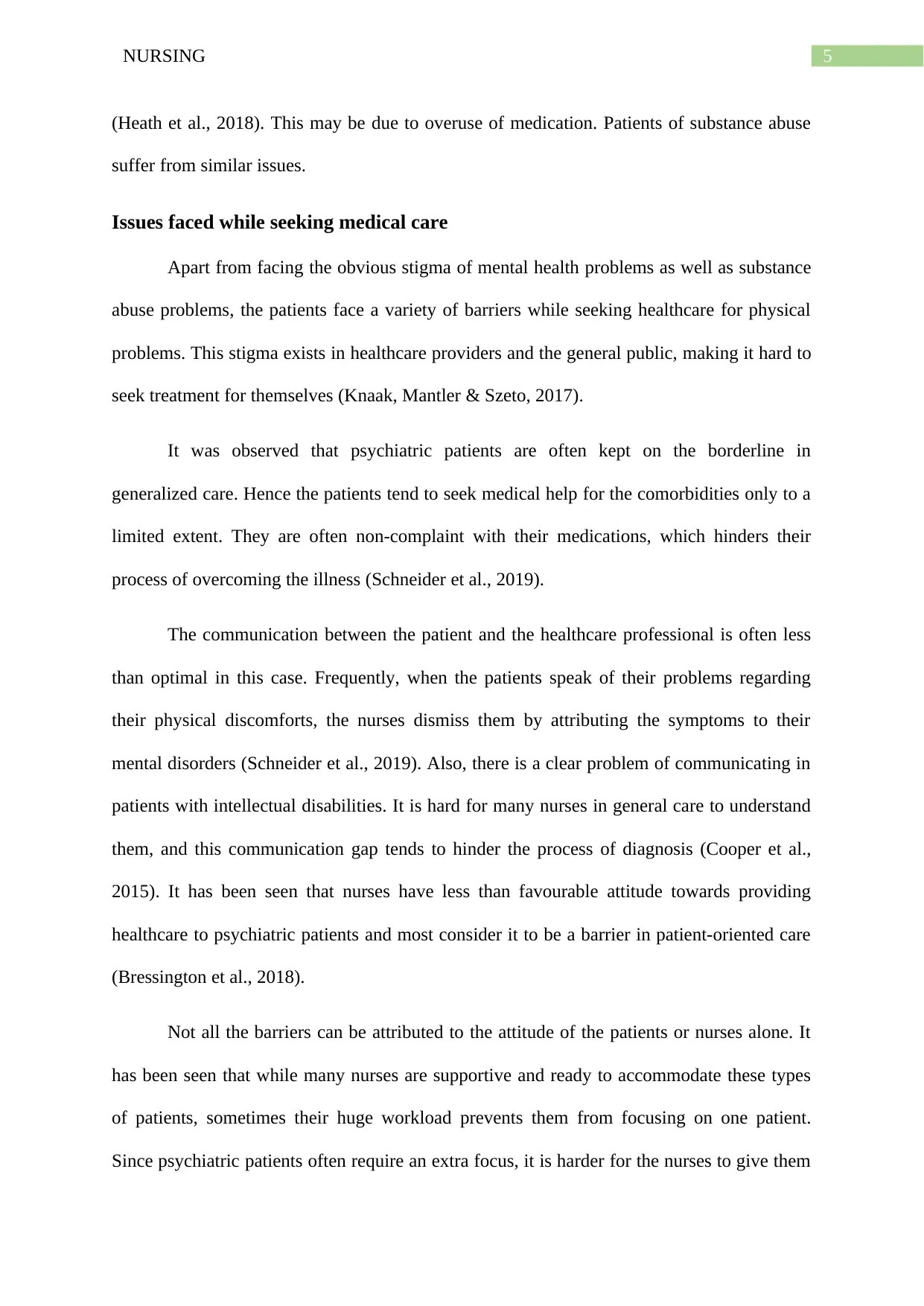
5NURSING
(Heath et al., 2018). This may be due to overuse of medication. Patients of substance abuse
suffer from similar issues.
Issues faced while seeking medical care
Apart from facing the obvious stigma of mental health problems as well as substance
abuse problems, the patients face a variety of barriers while seeking healthcare for physical
problems. This stigma exists in healthcare providers and the general public, making it hard to
seek treatment for themselves (Knaak, Mantler & Szeto, 2017).
It was observed that psychiatric patients are often kept on the borderline in
generalized care. Hence the patients tend to seek medical help for the comorbidities only to a
limited extent. They are often non-complaint with their medications, which hinders their
process of overcoming the illness (Schneider et al., 2019).
The communication between the patient and the healthcare professional is often less
than optimal in this case. Frequently, when the patients speak of their problems regarding
their physical discomforts, the nurses dismiss them by attributing the symptoms to their
mental disorders (Schneider et al., 2019). Also, there is a clear problem of communicating in
patients with intellectual disabilities. It is hard for many nurses in general care to understand
them, and this communication gap tends to hinder the process of diagnosis (Cooper et al.,
2015). It has been seen that nurses have less than favourable attitude towards providing
healthcare to psychiatric patients and most consider it to be a barrier in patient-oriented care
(Bressington et al., 2018).
Not all the barriers can be attributed to the attitude of the patients or nurses alone. It
has been seen that while many nurses are supportive and ready to accommodate these types
of patients, sometimes their huge workload prevents them from focusing on one patient.
Since psychiatric patients often require an extra focus, it is harder for the nurses to give them
(Heath et al., 2018). This may be due to overuse of medication. Patients of substance abuse
suffer from similar issues.
Issues faced while seeking medical care
Apart from facing the obvious stigma of mental health problems as well as substance
abuse problems, the patients face a variety of barriers while seeking healthcare for physical
problems. This stigma exists in healthcare providers and the general public, making it hard to
seek treatment for themselves (Knaak, Mantler & Szeto, 2017).
It was observed that psychiatric patients are often kept on the borderline in
generalized care. Hence the patients tend to seek medical help for the comorbidities only to a
limited extent. They are often non-complaint with their medications, which hinders their
process of overcoming the illness (Schneider et al., 2019).
The communication between the patient and the healthcare professional is often less
than optimal in this case. Frequently, when the patients speak of their problems regarding
their physical discomforts, the nurses dismiss them by attributing the symptoms to their
mental disorders (Schneider et al., 2019). Also, there is a clear problem of communicating in
patients with intellectual disabilities. It is hard for many nurses in general care to understand
them, and this communication gap tends to hinder the process of diagnosis (Cooper et al.,
2015). It has been seen that nurses have less than favourable attitude towards providing
healthcare to psychiatric patients and most consider it to be a barrier in patient-oriented care
(Bressington et al., 2018).
Not all the barriers can be attributed to the attitude of the patients or nurses alone. It
has been seen that while many nurses are supportive and ready to accommodate these types
of patients, sometimes their huge workload prevents them from focusing on one patient.
Since psychiatric patients often require an extra focus, it is harder for the nurses to give them
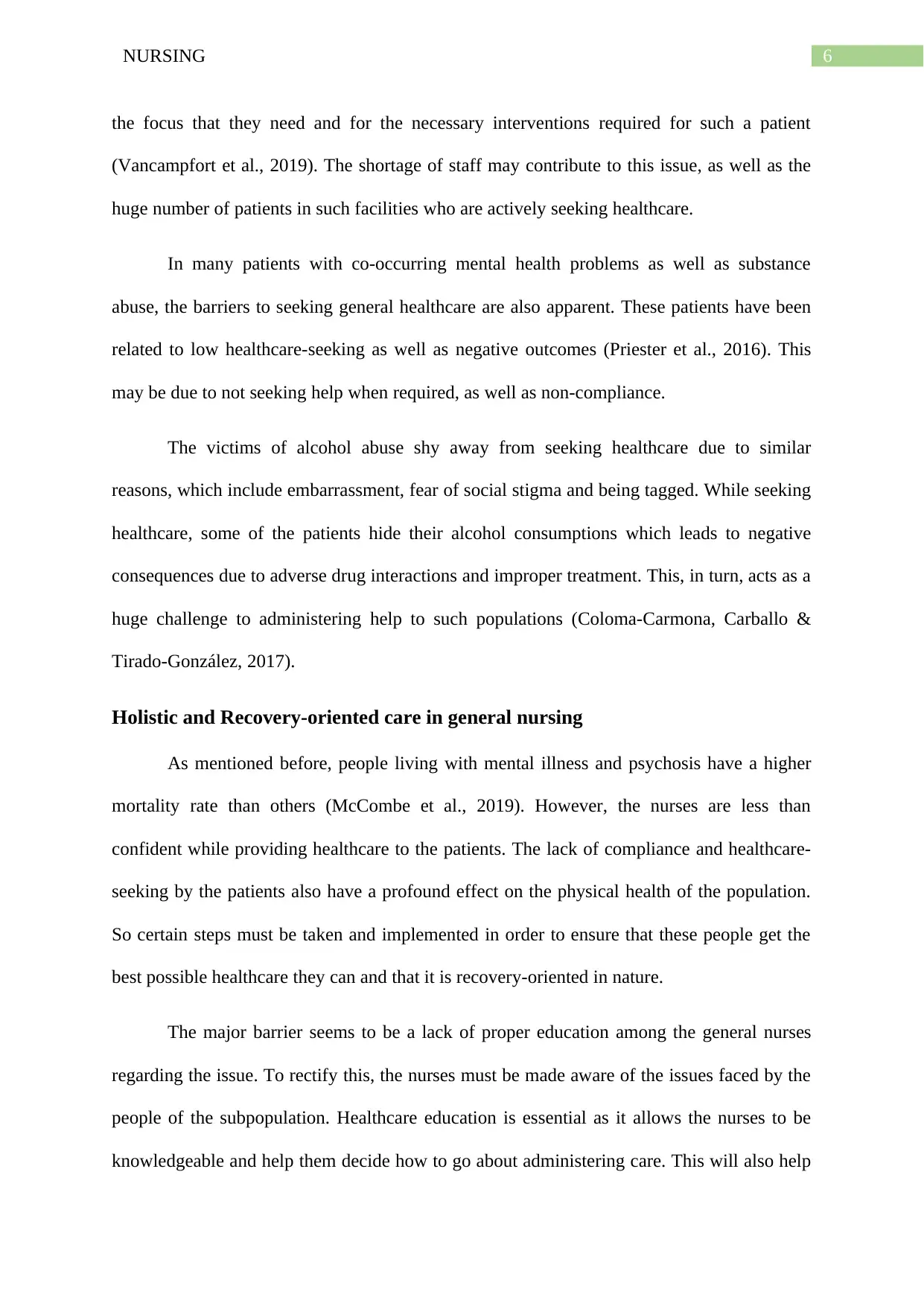
6NURSING
the focus that they need and for the necessary interventions required for such a patient
(Vancampfort et al., 2019). The shortage of staff may contribute to this issue, as well as the
huge number of patients in such facilities who are actively seeking healthcare.
In many patients with co-occurring mental health problems as well as substance
abuse, the barriers to seeking general healthcare are also apparent. These patients have been
related to low healthcare-seeking as well as negative outcomes (Priester et al., 2016). This
may be due to not seeking help when required, as well as non-compliance.
The victims of alcohol abuse shy away from seeking healthcare due to similar
reasons, which include embarrassment, fear of social stigma and being tagged. While seeking
healthcare, some of the patients hide their alcohol consumptions which leads to negative
consequences due to adverse drug interactions and improper treatment. This, in turn, acts as a
huge challenge to administering help to such populations (Coloma-Carmona, Carballo &
Tirado-González, 2017).
Holistic and Recovery-oriented care in general nursing
As mentioned before, people living with mental illness and psychosis have a higher
mortality rate than others (McCombe et al., 2019). However, the nurses are less than
confident while providing healthcare to the patients. The lack of compliance and healthcare-
seeking by the patients also have a profound effect on the physical health of the population.
So certain steps must be taken and implemented in order to ensure that these people get the
best possible healthcare they can and that it is recovery-oriented in nature.
The major barrier seems to be a lack of proper education among the general nurses
regarding the issue. To rectify this, the nurses must be made aware of the issues faced by the
people of the subpopulation. Healthcare education is essential as it allows the nurses to be
knowledgeable and help them decide how to go about administering care. This will also help
the focus that they need and for the necessary interventions required for such a patient
(Vancampfort et al., 2019). The shortage of staff may contribute to this issue, as well as the
huge number of patients in such facilities who are actively seeking healthcare.
In many patients with co-occurring mental health problems as well as substance
abuse, the barriers to seeking general healthcare are also apparent. These patients have been
related to low healthcare-seeking as well as negative outcomes (Priester et al., 2016). This
may be due to not seeking help when required, as well as non-compliance.
The victims of alcohol abuse shy away from seeking healthcare due to similar
reasons, which include embarrassment, fear of social stigma and being tagged. While seeking
healthcare, some of the patients hide their alcohol consumptions which leads to negative
consequences due to adverse drug interactions and improper treatment. This, in turn, acts as a
huge challenge to administering help to such populations (Coloma-Carmona, Carballo &
Tirado-González, 2017).
Holistic and Recovery-oriented care in general nursing
As mentioned before, people living with mental illness and psychosis have a higher
mortality rate than others (McCombe et al., 2019). However, the nurses are less than
confident while providing healthcare to the patients. The lack of compliance and healthcare-
seeking by the patients also have a profound effect on the physical health of the population.
So certain steps must be taken and implemented in order to ensure that these people get the
best possible healthcare they can and that it is recovery-oriented in nature.
The major barrier seems to be a lack of proper education among the general nurses
regarding the issue. To rectify this, the nurses must be made aware of the issues faced by the
people of the subpopulation. Healthcare education is essential as it allows the nurses to be
knowledgeable and help them decide how to go about administering care. This will also help
Paraphrase This Document
Need a fresh take? Get an instant paraphrase of this document with our AI Paraphraser
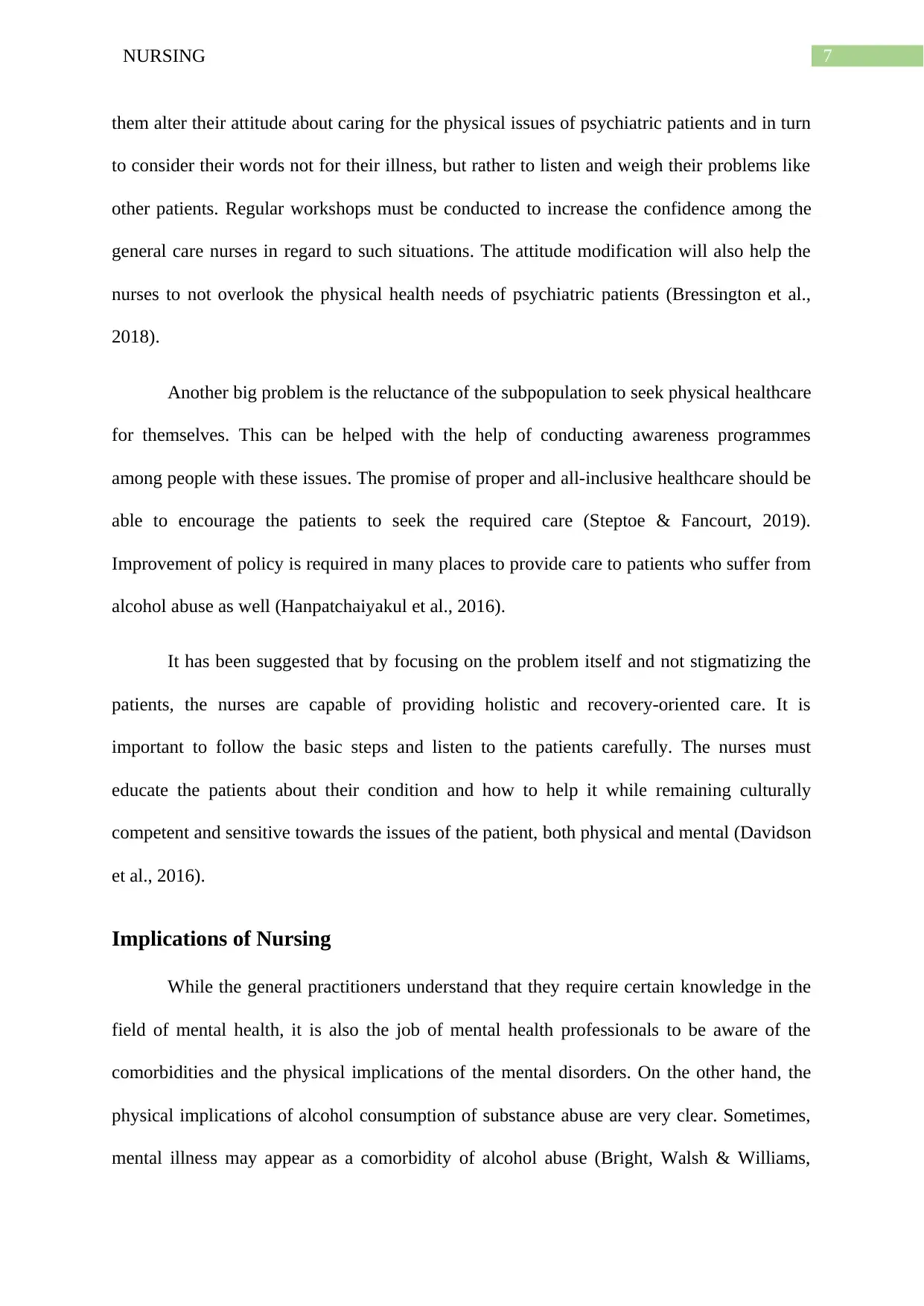
7NURSING
them alter their attitude about caring for the physical issues of psychiatric patients and in turn
to consider their words not for their illness, but rather to listen and weigh their problems like
other patients. Regular workshops must be conducted to increase the confidence among the
general care nurses in regard to such situations. The attitude modification will also help the
nurses to not overlook the physical health needs of psychiatric patients (Bressington et al.,
2018).
Another big problem is the reluctance of the subpopulation to seek physical healthcare
for themselves. This can be helped with the help of conducting awareness programmes
among people with these issues. The promise of proper and all-inclusive healthcare should be
able to encourage the patients to seek the required care (Steptoe & Fancourt, 2019).
Improvement of policy is required in many places to provide care to patients who suffer from
alcohol abuse as well (Hanpatchaiyakul et al., 2016).
It has been suggested that by focusing on the problem itself and not stigmatizing the
patients, the nurses are capable of providing holistic and recovery-oriented care. It is
important to follow the basic steps and listen to the patients carefully. The nurses must
educate the patients about their condition and how to help it while remaining culturally
competent and sensitive towards the issues of the patient, both physical and mental (Davidson
et al., 2016).
Implications of Nursing
While the general practitioners understand that they require certain knowledge in the
field of mental health, it is also the job of mental health professionals to be aware of the
comorbidities and the physical implications of the mental disorders. On the other hand, the
physical implications of alcohol consumption of substance abuse are very clear. Sometimes,
mental illness may appear as a comorbidity of alcohol abuse (Bright, Walsh & Williams,
them alter their attitude about caring for the physical issues of psychiatric patients and in turn
to consider their words not for their illness, but rather to listen and weigh their problems like
other patients. Regular workshops must be conducted to increase the confidence among the
general care nurses in regard to such situations. The attitude modification will also help the
nurses to not overlook the physical health needs of psychiatric patients (Bressington et al.,
2018).
Another big problem is the reluctance of the subpopulation to seek physical healthcare
for themselves. This can be helped with the help of conducting awareness programmes
among people with these issues. The promise of proper and all-inclusive healthcare should be
able to encourage the patients to seek the required care (Steptoe & Fancourt, 2019).
Improvement of policy is required in many places to provide care to patients who suffer from
alcohol abuse as well (Hanpatchaiyakul et al., 2016).
It has been suggested that by focusing on the problem itself and not stigmatizing the
patients, the nurses are capable of providing holistic and recovery-oriented care. It is
important to follow the basic steps and listen to the patients carefully. The nurses must
educate the patients about their condition and how to help it while remaining culturally
competent and sensitive towards the issues of the patient, both physical and mental (Davidson
et al., 2016).
Implications of Nursing
While the general practitioners understand that they require certain knowledge in the
field of mental health, it is also the job of mental health professionals to be aware of the
comorbidities and the physical implications of the mental disorders. On the other hand, the
physical implications of alcohol consumption of substance abuse are very clear. Sometimes,
mental illness may appear as a comorbidity of alcohol abuse (Bright, Walsh & Williams,
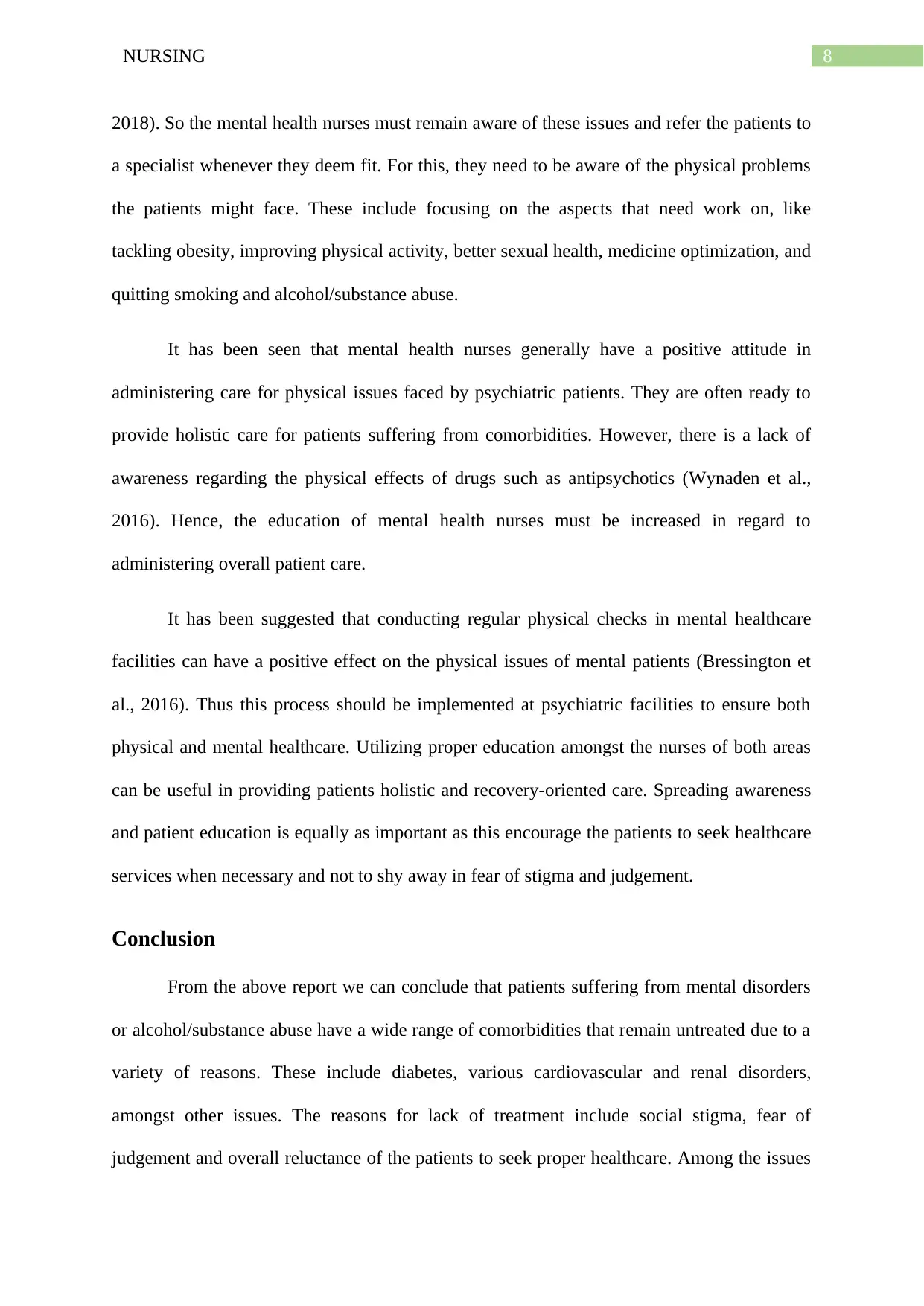
8NURSING
2018). So the mental health nurses must remain aware of these issues and refer the patients to
a specialist whenever they deem fit. For this, they need to be aware of the physical problems
the patients might face. These include focusing on the aspects that need work on, like
tackling obesity, improving physical activity, better sexual health, medicine optimization, and
quitting smoking and alcohol/substance abuse.
It has been seen that mental health nurses generally have a positive attitude in
administering care for physical issues faced by psychiatric patients. They are often ready to
provide holistic care for patients suffering from comorbidities. However, there is a lack of
awareness regarding the physical effects of drugs such as antipsychotics (Wynaden et al.,
2016). Hence, the education of mental health nurses must be increased in regard to
administering overall patient care.
It has been suggested that conducting regular physical checks in mental healthcare
facilities can have a positive effect on the physical issues of mental patients (Bressington et
al., 2016). Thus this process should be implemented at psychiatric facilities to ensure both
physical and mental healthcare. Utilizing proper education amongst the nurses of both areas
can be useful in providing patients holistic and recovery-oriented care. Spreading awareness
and patient education is equally as important as this encourage the patients to seek healthcare
services when necessary and not to shy away in fear of stigma and judgement.
Conclusion
From the above report we can conclude that patients suffering from mental disorders
or alcohol/substance abuse have a wide range of comorbidities that remain untreated due to a
variety of reasons. These include diabetes, various cardiovascular and renal disorders,
amongst other issues. The reasons for lack of treatment include social stigma, fear of
judgement and overall reluctance of the patients to seek proper healthcare. Among the issues
2018). So the mental health nurses must remain aware of these issues and refer the patients to
a specialist whenever they deem fit. For this, they need to be aware of the physical problems
the patients might face. These include focusing on the aspects that need work on, like
tackling obesity, improving physical activity, better sexual health, medicine optimization, and
quitting smoking and alcohol/substance abuse.
It has been seen that mental health nurses generally have a positive attitude in
administering care for physical issues faced by psychiatric patients. They are often ready to
provide holistic care for patients suffering from comorbidities. However, there is a lack of
awareness regarding the physical effects of drugs such as antipsychotics (Wynaden et al.,
2016). Hence, the education of mental health nurses must be increased in regard to
administering overall patient care.
It has been suggested that conducting regular physical checks in mental healthcare
facilities can have a positive effect on the physical issues of mental patients (Bressington et
al., 2016). Thus this process should be implemented at psychiatric facilities to ensure both
physical and mental healthcare. Utilizing proper education amongst the nurses of both areas
can be useful in providing patients holistic and recovery-oriented care. Spreading awareness
and patient education is equally as important as this encourage the patients to seek healthcare
services when necessary and not to shy away in fear of stigma and judgement.
Conclusion
From the above report we can conclude that patients suffering from mental disorders
or alcohol/substance abuse have a wide range of comorbidities that remain untreated due to a
variety of reasons. These include diabetes, various cardiovascular and renal disorders,
amongst other issues. The reasons for lack of treatment include social stigma, fear of
judgement and overall reluctance of the patients to seek proper healthcare. Among the issues
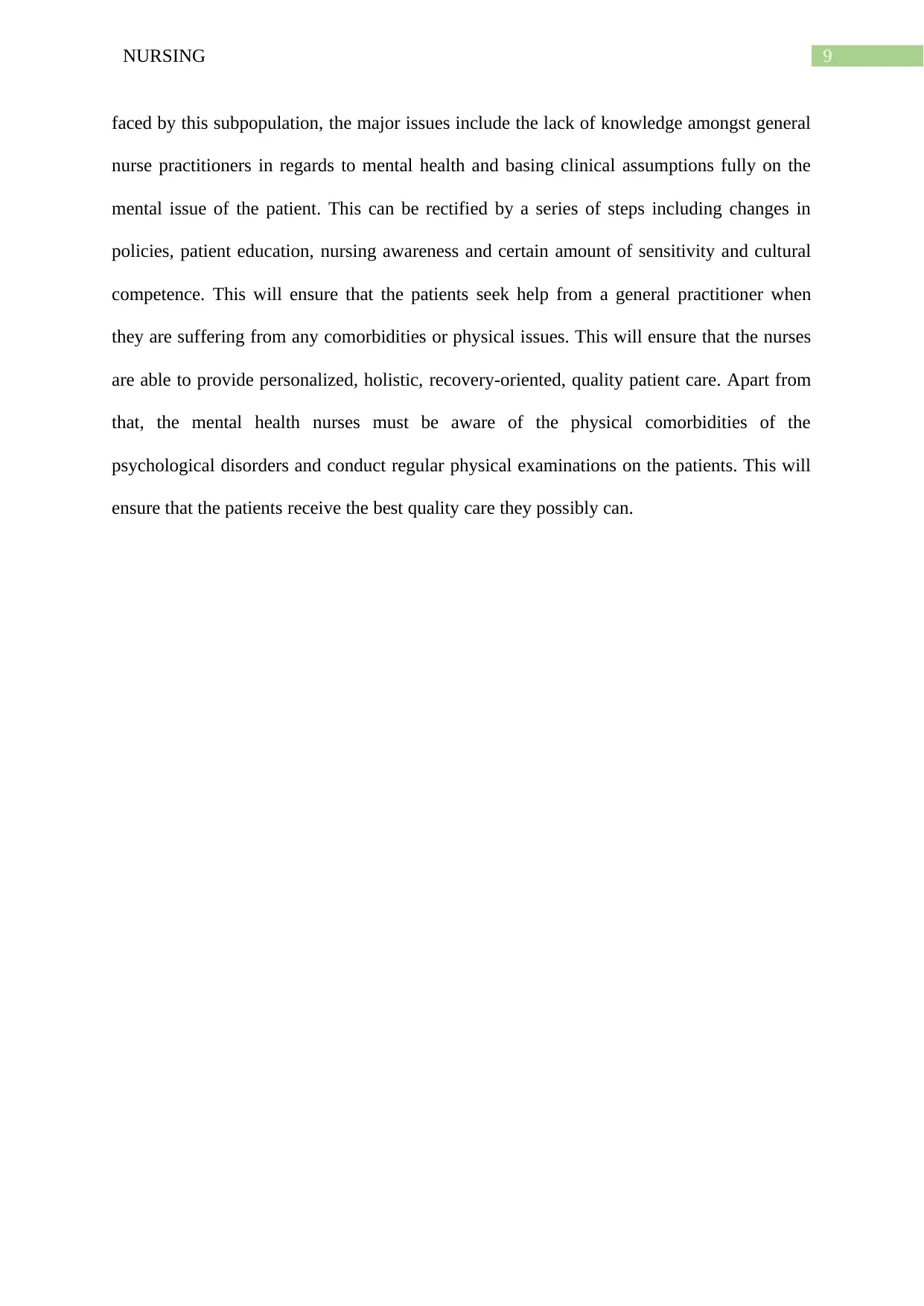
9NURSING
faced by this subpopulation, the major issues include the lack of knowledge amongst general
nurse practitioners in regards to mental health and basing clinical assumptions fully on the
mental issue of the patient. This can be rectified by a series of steps including changes in
policies, patient education, nursing awareness and certain amount of sensitivity and cultural
competence. This will ensure that the patients seek help from a general practitioner when
they are suffering from any comorbidities or physical issues. This will ensure that the nurses
are able to provide personalized, holistic, recovery-oriented, quality patient care. Apart from
that, the mental health nurses must be aware of the physical comorbidities of the
psychological disorders and conduct regular physical examinations on the patients. This will
ensure that the patients receive the best quality care they possibly can.
faced by this subpopulation, the major issues include the lack of knowledge amongst general
nurse practitioners in regards to mental health and basing clinical assumptions fully on the
mental issue of the patient. This can be rectified by a series of steps including changes in
policies, patient education, nursing awareness and certain amount of sensitivity and cultural
competence. This will ensure that the patients seek help from a general practitioner when
they are suffering from any comorbidities or physical issues. This will ensure that the nurses
are able to provide personalized, holistic, recovery-oriented, quality patient care. Apart from
that, the mental health nurses must be aware of the physical comorbidities of the
psychological disorders and conduct regular physical examinations on the patients. This will
ensure that the patients receive the best quality care they possibly can.
Secure Best Marks with AI Grader
Need help grading? Try our AI Grader for instant feedback on your assignments.
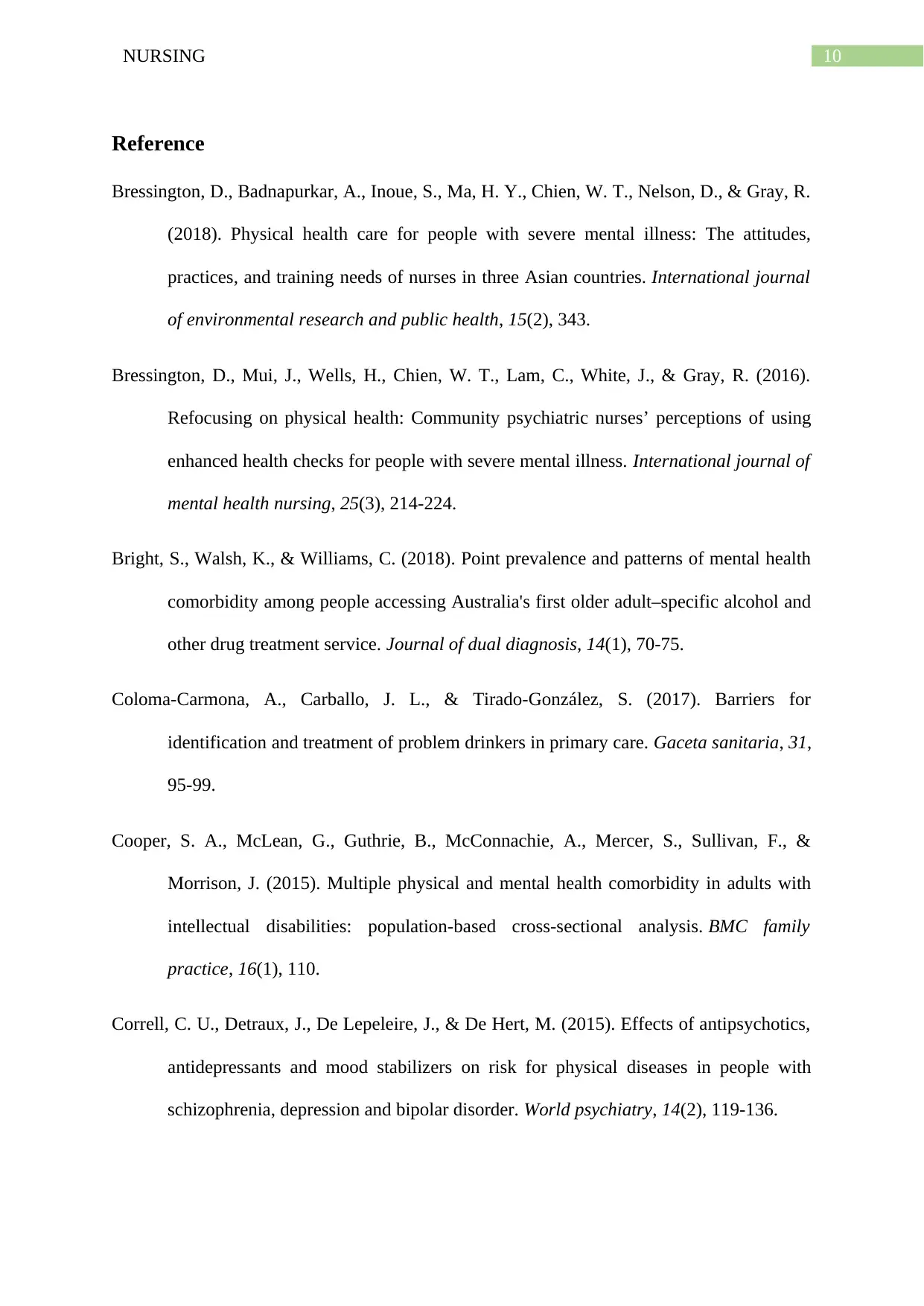
10NURSING
Reference
Bressington, D., Badnapurkar, A., Inoue, S., Ma, H. Y., Chien, W. T., Nelson, D., & Gray, R.
(2018). Physical health care for people with severe mental illness: The attitudes,
practices, and training needs of nurses in three Asian countries. International journal
of environmental research and public health, 15(2), 343.
Bressington, D., Mui, J., Wells, H., Chien, W. T., Lam, C., White, J., & Gray, R. (2016).
Refocusing on physical health: Community psychiatric nurses’ perceptions of using
enhanced health checks for people with severe mental illness. International journal of
mental health nursing, 25(3), 214-224.
Bright, S., Walsh, K., & Williams, C. (2018). Point prevalence and patterns of mental health
comorbidity among people accessing Australia's first older adult–specific alcohol and
other drug treatment service. Journal of dual diagnosis, 14(1), 70-75.
Coloma-Carmona, A., Carballo, J. L., & Tirado-González, S. (2017). Barriers for
identification and treatment of problem drinkers in primary care. Gaceta sanitaria, 31,
95-99.
Cooper, S. A., McLean, G., Guthrie, B., McConnachie, A., Mercer, S., Sullivan, F., &
Morrison, J. (2015). Multiple physical and mental health comorbidity in adults with
intellectual disabilities: population-based cross-sectional analysis. BMC family
practice, 16(1), 110.
Correll, C. U., Detraux, J., De Lepeleire, J., & De Hert, M. (2015). Effects of antipsychotics,
antidepressants and mood stabilizers on risk for physical diseases in people with
schizophrenia, depression and bipolar disorder. World psychiatry, 14(2), 119-136.
Reference
Bressington, D., Badnapurkar, A., Inoue, S., Ma, H. Y., Chien, W. T., Nelson, D., & Gray, R.
(2018). Physical health care for people with severe mental illness: The attitudes,
practices, and training needs of nurses in three Asian countries. International journal
of environmental research and public health, 15(2), 343.
Bressington, D., Mui, J., Wells, H., Chien, W. T., Lam, C., White, J., & Gray, R. (2016).
Refocusing on physical health: Community psychiatric nurses’ perceptions of using
enhanced health checks for people with severe mental illness. International journal of
mental health nursing, 25(3), 214-224.
Bright, S., Walsh, K., & Williams, C. (2018). Point prevalence and patterns of mental health
comorbidity among people accessing Australia's first older adult–specific alcohol and
other drug treatment service. Journal of dual diagnosis, 14(1), 70-75.
Coloma-Carmona, A., Carballo, J. L., & Tirado-González, S. (2017). Barriers for
identification and treatment of problem drinkers in primary care. Gaceta sanitaria, 31,
95-99.
Cooper, S. A., McLean, G., Guthrie, B., McConnachie, A., Mercer, S., Sullivan, F., &
Morrison, J. (2015). Multiple physical and mental health comorbidity in adults with
intellectual disabilities: population-based cross-sectional analysis. BMC family
practice, 16(1), 110.
Correll, C. U., Detraux, J., De Lepeleire, J., & De Hert, M. (2015). Effects of antipsychotics,
antidepressants and mood stabilizers on risk for physical diseases in people with
schizophrenia, depression and bipolar disorder. World psychiatry, 14(2), 119-136.
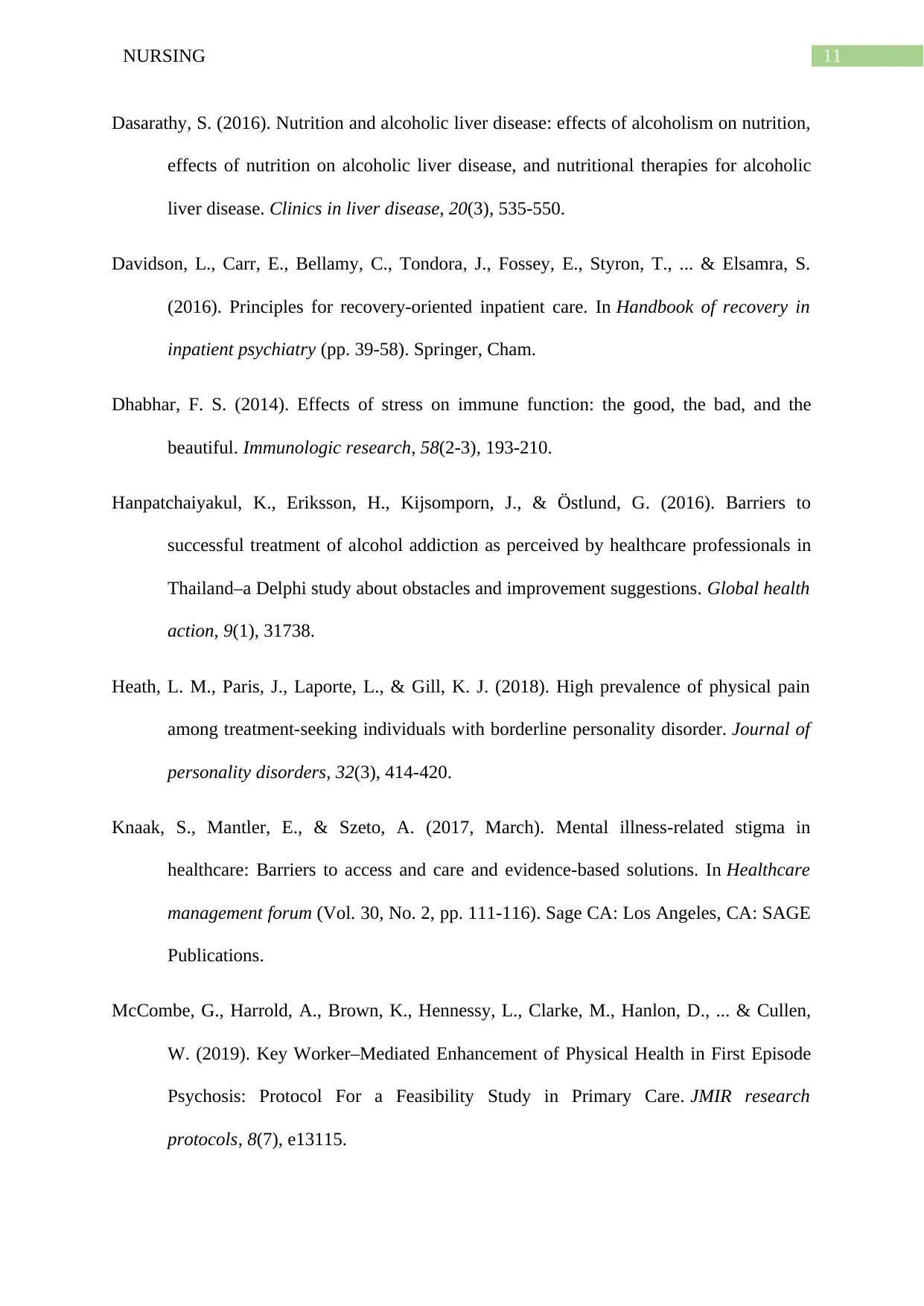
11NURSING
Dasarathy, S. (2016). Nutrition and alcoholic liver disease: effects of alcoholism on nutrition,
effects of nutrition on alcoholic liver disease, and nutritional therapies for alcoholic
liver disease. Clinics in liver disease, 20(3), 535-550.
Davidson, L., Carr, E., Bellamy, C., Tondora, J., Fossey, E., Styron, T., ... & Elsamra, S.
(2016). Principles for recovery-oriented inpatient care. In Handbook of recovery in
inpatient psychiatry (pp. 39-58). Springer, Cham.
Dhabhar, F. S. (2014). Effects of stress on immune function: the good, the bad, and the
beautiful. Immunologic research, 58(2-3), 193-210.
Hanpatchaiyakul, K., Eriksson, H., Kijsomporn, J., & Östlund, G. (2016). Barriers to
successful treatment of alcohol addiction as perceived by healthcare professionals in
Thailand–a Delphi study about obstacles and improvement suggestions. Global health
action, 9(1), 31738.
Heath, L. M., Paris, J., Laporte, L., & Gill, K. J. (2018). High prevalence of physical pain
among treatment-seeking individuals with borderline personality disorder. Journal of
personality disorders, 32(3), 414-420.
Knaak, S., Mantler, E., & Szeto, A. (2017, March). Mental illness-related stigma in
healthcare: Barriers to access and care and evidence-based solutions. In Healthcare
management forum (Vol. 30, No. 2, pp. 111-116). Sage CA: Los Angeles, CA: SAGE
Publications.
McCombe, G., Harrold, A., Brown, K., Hennessy, L., Clarke, M., Hanlon, D., ... & Cullen,
W. (2019). Key Worker–Mediated Enhancement of Physical Health in First Episode
Psychosis: Protocol For a Feasibility Study in Primary Care. JMIR research
protocols, 8(7), e13115.
Dasarathy, S. (2016). Nutrition and alcoholic liver disease: effects of alcoholism on nutrition,
effects of nutrition on alcoholic liver disease, and nutritional therapies for alcoholic
liver disease. Clinics in liver disease, 20(3), 535-550.
Davidson, L., Carr, E., Bellamy, C., Tondora, J., Fossey, E., Styron, T., ... & Elsamra, S.
(2016). Principles for recovery-oriented inpatient care. In Handbook of recovery in
inpatient psychiatry (pp. 39-58). Springer, Cham.
Dhabhar, F. S. (2014). Effects of stress on immune function: the good, the bad, and the
beautiful. Immunologic research, 58(2-3), 193-210.
Hanpatchaiyakul, K., Eriksson, H., Kijsomporn, J., & Östlund, G. (2016). Barriers to
successful treatment of alcohol addiction as perceived by healthcare professionals in
Thailand–a Delphi study about obstacles and improvement suggestions. Global health
action, 9(1), 31738.
Heath, L. M., Paris, J., Laporte, L., & Gill, K. J. (2018). High prevalence of physical pain
among treatment-seeking individuals with borderline personality disorder. Journal of
personality disorders, 32(3), 414-420.
Knaak, S., Mantler, E., & Szeto, A. (2017, March). Mental illness-related stigma in
healthcare: Barriers to access and care and evidence-based solutions. In Healthcare
management forum (Vol. 30, No. 2, pp. 111-116). Sage CA: Los Angeles, CA: SAGE
Publications.
McCombe, G., Harrold, A., Brown, K., Hennessy, L., Clarke, M., Hanlon, D., ... & Cullen,
W. (2019). Key Worker–Mediated Enhancement of Physical Health in First Episode
Psychosis: Protocol For a Feasibility Study in Primary Care. JMIR research
protocols, 8(7), e13115.
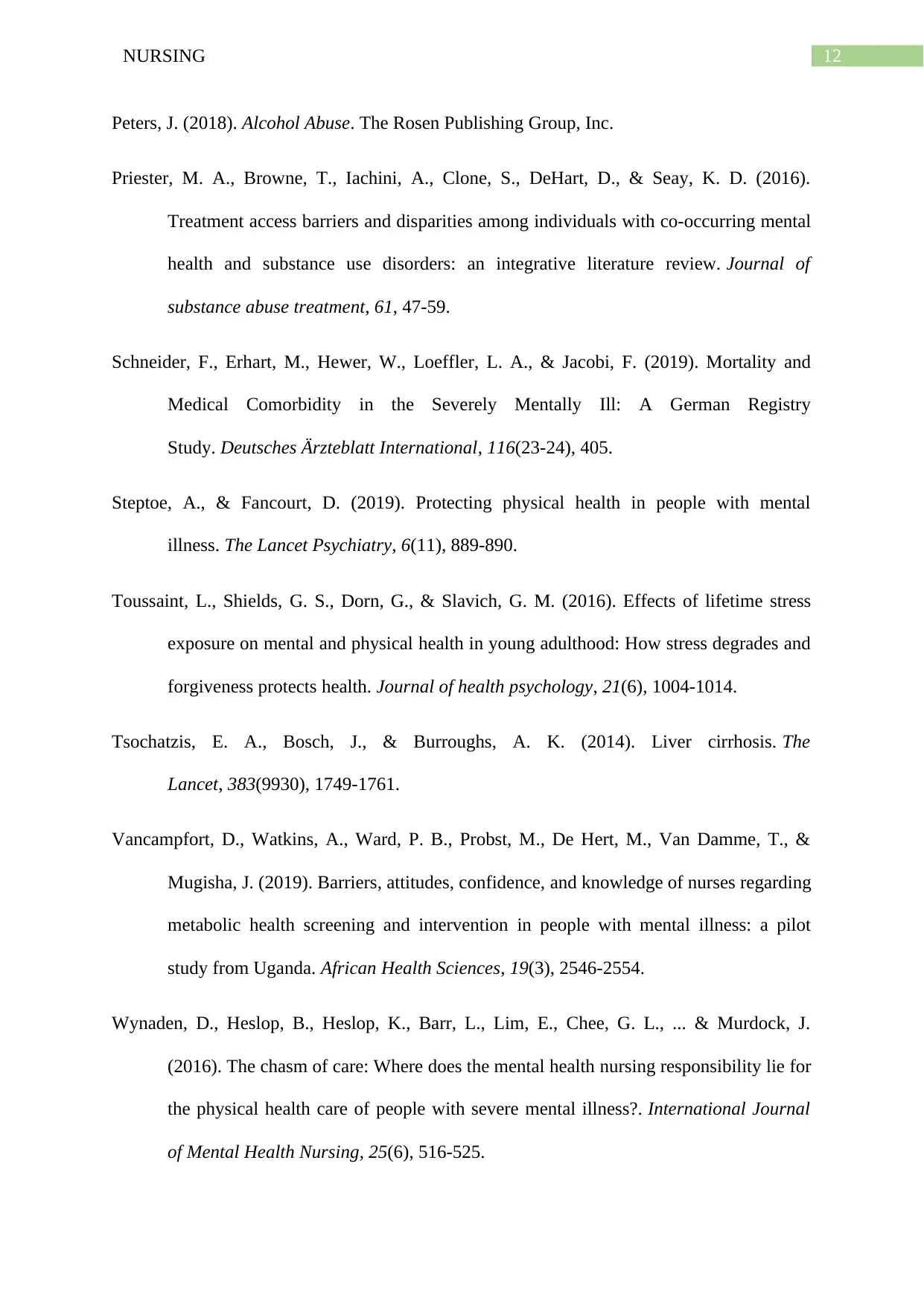
12NURSING
Peters, J. (2018). Alcohol Abuse. The Rosen Publishing Group, Inc.
Priester, M. A., Browne, T., Iachini, A., Clone, S., DeHart, D., & Seay, K. D. (2016).
Treatment access barriers and disparities among individuals with co-occurring mental
health and substance use disorders: an integrative literature review. Journal of
substance abuse treatment, 61, 47-59.
Schneider, F., Erhart, M., Hewer, W., Loeffler, L. A., & Jacobi, F. (2019). Mortality and
Medical Comorbidity in the Severely Mentally Ill: A German Registry
Study. Deutsches Ärzteblatt International, 116(23-24), 405.
Steptoe, A., & Fancourt, D. (2019). Protecting physical health in people with mental
illness. The Lancet Psychiatry, 6(11), 889-890.
Toussaint, L., Shields, G. S., Dorn, G., & Slavich, G. M. (2016). Effects of lifetime stress
exposure on mental and physical health in young adulthood: How stress degrades and
forgiveness protects health. Journal of health psychology, 21(6), 1004-1014.
Tsochatzis, E. A., Bosch, J., & Burroughs, A. K. (2014). Liver cirrhosis. The
Lancet, 383(9930), 1749-1761.
Vancampfort, D., Watkins, A., Ward, P. B., Probst, M., De Hert, M., Van Damme, T., &
Mugisha, J. (2019). Barriers, attitudes, confidence, and knowledge of nurses regarding
metabolic health screening and intervention in people with mental illness: a pilot
study from Uganda. African Health Sciences, 19(3), 2546-2554.
Wynaden, D., Heslop, B., Heslop, K., Barr, L., Lim, E., Chee, G. L., ... & Murdock, J.
(2016). The chasm of care: Where does the mental health nursing responsibility lie for
the physical health care of people with severe mental illness?. International Journal
of Mental Health Nursing, 25(6), 516-525.
Peters, J. (2018). Alcohol Abuse. The Rosen Publishing Group, Inc.
Priester, M. A., Browne, T., Iachini, A., Clone, S., DeHart, D., & Seay, K. D. (2016).
Treatment access barriers and disparities among individuals with co-occurring mental
health and substance use disorders: an integrative literature review. Journal of
substance abuse treatment, 61, 47-59.
Schneider, F., Erhart, M., Hewer, W., Loeffler, L. A., & Jacobi, F. (2019). Mortality and
Medical Comorbidity in the Severely Mentally Ill: A German Registry
Study. Deutsches Ärzteblatt International, 116(23-24), 405.
Steptoe, A., & Fancourt, D. (2019). Protecting physical health in people with mental
illness. The Lancet Psychiatry, 6(11), 889-890.
Toussaint, L., Shields, G. S., Dorn, G., & Slavich, G. M. (2016). Effects of lifetime stress
exposure on mental and physical health in young adulthood: How stress degrades and
forgiveness protects health. Journal of health psychology, 21(6), 1004-1014.
Tsochatzis, E. A., Bosch, J., & Burroughs, A. K. (2014). Liver cirrhosis. The
Lancet, 383(9930), 1749-1761.
Vancampfort, D., Watkins, A., Ward, P. B., Probst, M., De Hert, M., Van Damme, T., &
Mugisha, J. (2019). Barriers, attitudes, confidence, and knowledge of nurses regarding
metabolic health screening and intervention in people with mental illness: a pilot
study from Uganda. African Health Sciences, 19(3), 2546-2554.
Wynaden, D., Heslop, B., Heslop, K., Barr, L., Lim, E., Chee, G. L., ... & Murdock, J.
(2016). The chasm of care: Where does the mental health nursing responsibility lie for
the physical health care of people with severe mental illness?. International Journal
of Mental Health Nursing, 25(6), 516-525.
Paraphrase This Document
Need a fresh take? Get an instant paraphrase of this document with our AI Paraphraser
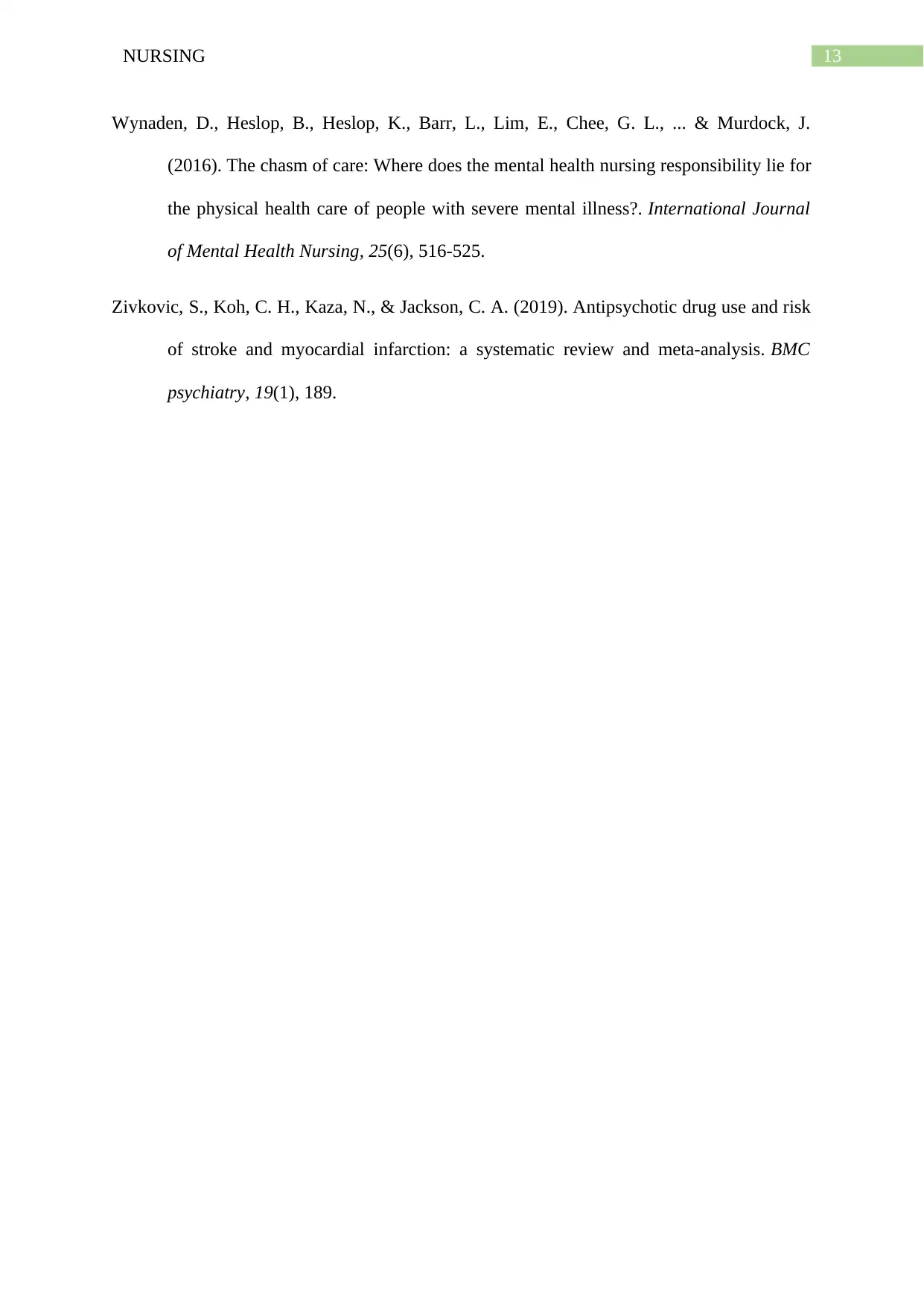
13NURSING
Wynaden, D., Heslop, B., Heslop, K., Barr, L., Lim, E., Chee, G. L., ... & Murdock, J.
(2016). The chasm of care: Where does the mental health nursing responsibility lie for
the physical health care of people with severe mental illness?. International Journal
of Mental Health Nursing, 25(6), 516-525.
Zivkovic, S., Koh, C. H., Kaza, N., & Jackson, C. A. (2019). Antipsychotic drug use and risk
of stroke and myocardial infarction: a systematic review and meta-analysis. BMC
psychiatry, 19(1), 189.
Wynaden, D., Heslop, B., Heslop, K., Barr, L., Lim, E., Chee, G. L., ... & Murdock, J.
(2016). The chasm of care: Where does the mental health nursing responsibility lie for
the physical health care of people with severe mental illness?. International Journal
of Mental Health Nursing, 25(6), 516-525.
Zivkovic, S., Koh, C. H., Kaza, N., & Jackson, C. A. (2019). Antipsychotic drug use and risk
of stroke and myocardial infarction: a systematic review and meta-analysis. BMC
psychiatry, 19(1), 189.
1 out of 14
Related Documents
Your All-in-One AI-Powered Toolkit for Academic Success.
+13062052269
info@desklib.com
Available 24*7 on WhatsApp / Email
![[object Object]](/_next/static/media/star-bottom.7253800d.svg)
Unlock your academic potential
© 2024 | Zucol Services PVT LTD | All rights reserved.





